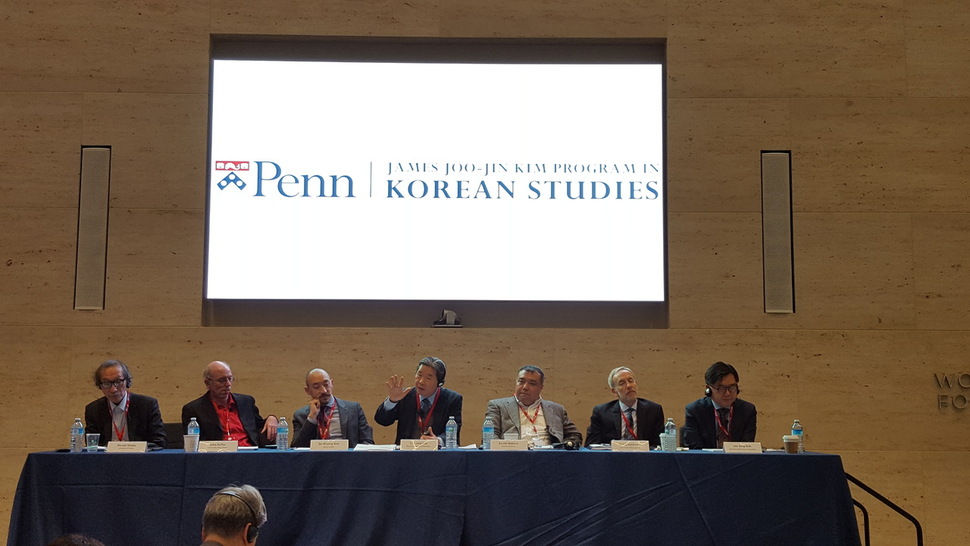 |
|
Panelists at the “Civic Engagement and State Policy for Peace in Northeast Asia” international symposium hosted by the University of Pennsylvania in Philadelphia on Dec. 1. (by Yi Yong-in, Washington correspondent)
|
Acceptance of “double freeze” deal and normalization of Japan-NK relations proposed as possible solutions
The future for peace and cooperation in northeast Asia is looking unclear, with North Korea’s improving nuclear and missile capabilities, the still-unresolved Japanese military comfort women issue, and the decline in internationalism and resurgence of nationalism. Activists with some of the most representative civil society groups campaigning for peace in the South Korea, the US, and Japan came together recently to discuss this future. Speaking at a Dec. 1 international symposium on “Civic Engagement and State Policy for Peace in Northeast Asia” at the University of Pennsylvania in Philadelphia, Tokyo University emeritus professor Haruki Wada called for an “unconditional normalization of relations with North Korea and Japan.” The event was organized by the university’s James Joo-Jin Kim Program in Korean Studies under professor Eugene Y. Park. “If the ‘double freeze’ framework proposed by China [a simultaneous halt to North Korea’s nuclear and missile testing and joint military exercises] is supplemented with normalization of North Korea-Japan relations, there could be substantive changes in the situation surrounding North Korea,” Wada suggested in his presentation. As a model for normalization of ties between Pyongyang and Tokyo, Wada pointed to the “Cuba model” of former US President Barack Obama. Defining the “Obama model” as “starting with the establishment of diplomatic relations and an embassy before moving on to real negotiations and a gradual end to economic sanctions,” he proposed a novel approach of placing diplomatic relations between North Korea and Japan at the beginning rather than at the end. Foreign Policy in Focus director John Feffer suggested starting discussions on non-security issues, pointing to climate change as a direct threat that all countries in Northeast Asia could agree upon. According to the Feffer, the results of environmental cooperation in Northeast Asia could translate over into other areas, including security. Se-Woong Koo, publisher of the English-language South Korean news site Korea Exposé, suggested there was “Korea fatigue” in the US over the comfort women issue. “The kind of genuine apology from Japan that South Korea is talking about is barely resonating at all in the international community,” he said. “The time has come to change the frame.” Koo also noted growing calls among local progressives to investigate the violent actions of South Korea’s own armed forces during the Vietnam War. “We need to present the comfort women issue beyond national borders as an international issue of male violence against women,” he suggested. Sophia University professor Koichi Nakano, a leading progressive academic and critic of the Shinzo Abe administration’s attempts to undermine Japan’s Peace Constitution, said a major characteristic of the country’s rightward lurch was that it is taking place “under the leadership of elites rather than ordinary Japanese.” Nakano also said Abe and US President Donald Trump “share anti-liberal impulses” and stressed the need to “transcend national identity politics and fixating too much on nationalism.” “We need a union of civil society transcending national borders,” he said. Hankuk University of Foreign Studies emeritus professor Lee Jang-hie said the “establishment of sustained peace in northeast Asia must start by establishing universal norms and values based in an Asian cultural identity.” “It is something that can never be achieved as long as we depend on a selfish attention to our individual national interests,” Lee argued. Also attending the conference that day were North East Asia Peace Center director Kim Young-ho, former National Institute of Korean History chairperson Yi Tae-jin, and University of Connecticut professor Alexis Dudden, who criticized that dark legacy of the “San Francisco System” – which refers to the system of bilateral alliances that the United States established with various nations in east Asia following the end of World War II – and discussed applying the peace community concept to Northeast Asia. By Yi Yong-in, Washington correspondent Please direct questions or comments to [english@hani.co.kr]






